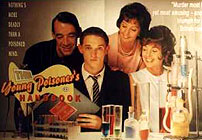|
|
|
|
The
Young Poisoner's Handbook
|
 |
|
All it takes is the first few notes of Purcell's "Music for the Funeral of Queen Mary" at the beginning of The Young Poisoner's Handbook to cue us to the fact that young writer-director Benjamin Ross is a keen fan of Stanley Kubrick – and specifically of A Clockwork Orange (1971), which used the same music. Kubrick is a master of the grotesque. The anti-heroes of several of his films may be sick and twisted, but the world around them is even more so – particularly the world of miserable suburbanites and petty bureaucrats. Peter Jackson's Heavenly Creatures (1994) – another film deeply indebted to Kubrick – took this principle of grotesque art to a new, giddy height. The Young Poisoner's Handbook has, intentionally or not, much in common with Heavenly Creatures. Graham (Hugh O'Conor), loosely based on a real-life figure, is a teenager locked up in an intensely private fantasy. Science and medicine offer him a hyper-rational way of understanding and controlling the world. This predilection soon leads him to an obsession with secretly preparing and administering poisons. Graham is, from start to end of the story, a nasty, thoroughly alienated sort. But, according to the darkly comic misanthropy of this grotesque tale, the society that produced him deserves little better than the serial extermination which Graham metes out. Working class Britain in the '60s has rarely looked so ghastly on screen. Family life is humiliating, sexual relations are mucky, friends are small-minded, and mass culture is truly sickening. Ross underlines all this with dizzy camera movements and exaggerated lighting that make every ugly mug just that bit uglier. Heavenly Creatures managed to modulate its dramatic tone from gleeful malice to a graver sense of tragedy by the story's end. The Young Poisoner's Handbook remains stuck in an adolescent rut, repeating ad nauseam its collision of a mad genius with a brutal environment. The first third of the film, showing Graham amid his horrid family, is the most sustained and enjoyable. With each subsequent major change of location (a stretch in prison, then in the workforce) Ross struggles to establish a new set of characters, and the net effect is rather like Graham's preferred poison – colourless and flavourless. The music, from Purcell to Jethro Tull, is essentially well chosen. But at the height of the film's parade of grotesquerie, a group of drooling, drunken office workers are shown bumping, grinding and groping at a party to the accompaniment of Serge Gainsbourg's pop classic "Je t'aime ... moi non plus" – not the original, I hasten to add, but an atrocious cover version. It was almost enough to make me lead a nightly picket line of Gainsbourg fans outside the cinema to protest such shameful indignity. © Adrian Martin October 1995 |
![]()